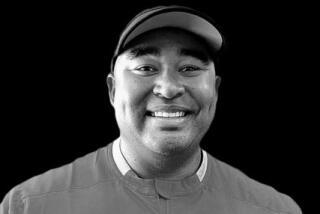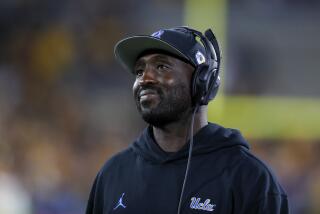Black Football Coaches Still Find That Openings Are Few at Major Colleges
- Share via
CHICAGO — Dennis Green would like to be the first black head football coach in the National Football League.
He figured being the only major college black head football coach wasn’t the way to get there. Green packed his bags last spring after four years at Northwestern to become an assistant with Bill Walsh and the San Francisco 49ers.
Northwestern replaced him with Francis Peay, who also happens to be black. It wasn’t a coincidence. Athletic Director Doug Single believed Peay was the best man for the job, although the tag “interim” remains in front of Peay’s name for the time being.
Green insists his frustrations with Northwestern had nothing to do with being black. It was the program, the limitations, the nature of the job which convinced him to leave.
“I knew that I had blazed a few trails in being the only major college football coach who was black,” Green said. “I wanted to move up. Unfortunately, this was about as far as I was going to go in this job.”
Northwestern is one of only three Division I-A schools with black head coaches. Cleve Bryant is in his second year at Ohio University in the Mid-American Conference and Wayne Nunnely is in his first year at Nevada Las Vegas. Green and Willie Jeffries of Wichita State had been the only two earlier in the 1980s before Jeffries was dismissed.
College basketball has seen more head coaching jobs go to blacks in the past decade for a variety of reasons. One, there are more jobs open and because, according to Green, more blacks were applying for assistantships and moving their way up.
In football there are still schools hiring blacks as assistants. Green said there just haven’t been enough promotions to full head coaching positions.
Green had to work his way up the ladder, serving as an assistant in the NFL and at Stanford and Iowa before he was selected by Northwestern to become the Big Ten’s first black football coach.
“We thought very highly of Dennis,” said Single, who was at Stanford the same time Green was there. “Same thing with Francis Peay. The situation is still open. Francis may wind up being the full-time, permanent coach here.”
Race wasn’t a factor; it wasn’t mentioned or considered, Single maintains.
“I’m looking forward to the day when it won’t even be a concern,” Green said of the number of black coaches in college major sports. “I know at Northwestern, they took Francis Peay because he was the most qualified and he will do a good job.”
Green said the climate is there for other blacks to move into head coaching positions. He dismisses the argument that some blacks would have a difficult time recruiting in some areas of the country.
“I can tell you one thing for certain. I had no problem. I was welcomed in everyone’s homes, not just in the big cities but in the South and West,” Green said. “I can’t speak for everyone, but when I was an assistant, they didn’t just give me an area where they thought it would be good for a black. I recruited black kids, white kids, all over the place.”
Peay, the former Missouri lineman who went on to play in the pros for Vince Lombardi and Dan Devine at Green Bay, does not warm up to the question of why there aren’t more blacks as head coaches.
“For me, it didn’t make any difference. I was the right man in the right place at the right time,” he says. “Again, it shouldn’t make any difference whether a man is black, Hispanic, white or whatever. It’s what he does on the job.”
However, Peay does concede that his apprenticeship as a defensive coordinator for five years under Green helped him more than any other factor.
“But I can’t tell you the way for there to be more blacks as head coaches is by having more black assistants,” Peay said. “You must take advantage of your opportunities.”
Peay said he learned the same way any other head coach would--by picking up things from others he has played for in the past.
“I am a disciplinarian. I got that from Lombardi. That doesn’t have anything to do with race,” Peay said. “I learned other things from Dan Devine. That didn’t have anything to do with race.”
Peay said he wants his players--black and white--not to see him in terms of race but as the head coach.
“I treat everyone the same in that respect,” Peay said. “I expect performance and dedication. That’s the same that any other head coach on any other level would expect.”
More to Read
Go beyond the scoreboard
Get the latest on L.A.'s teams in the daily Sports Report newsletter.
You may occasionally receive promotional content from the Los Angeles Times.










